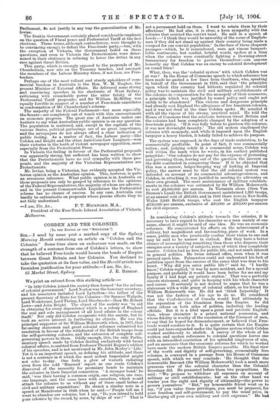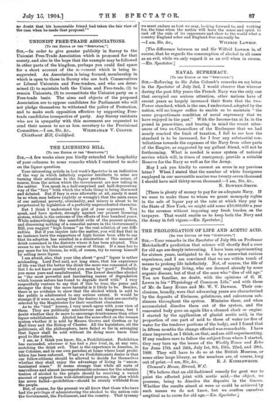[To TUE EDITOR OF TUE "SPECTAT0R."1
Stn,--I send by same post a marked copy of the Sydney Morning Herald containing an article on "Cobden and the . Colonies." Some time since an endeavour was made, on the strength of a sentence from one of Cobden's letters, to show that be believed Free-trade would loosen the bonds of Empire between Great Britain and her Colonies. You declined to take the quotation at its face value, and the Herald article now furnishes justification for your attitude.—I am, Sir, &c., 65 Market Street, Sydney. J. E. BISHOP.
" In 1850 Cobden joined the society then formed for the reform of colonial government.' Lord Norton was the honorary secretary, and his associates included Lord Lyttelton—the father of the present Secretary of State for the Colonies—Sir Spencer Walpole, Lord Wodehouse, Lord Thring, Lord Sherbrooke—then Mr. Robert Lowe—and John Bright. The object of the society was to aid in obtaining for every dependency which is a colony of England the real and sole management of all local affairs in the colony itself.' Not only did Cobden co-operate with the society, but he took an active interest in furthering its objects. He was the principal supporter of Sir William Molesworth when, in 1851, that far-seeing statesman and great colonial reformer submitted his resolution in favour of the withdrawal of the British troops from the self-governing colonies, and the extension of complete self- governing powers to them. Oddly enough, this, the only Parlia- mentary speech made by Cobden dealing exclusively with broad colonial affairs, is omitted from Professor Thorold Rogers's edition of his speeches, and is not mentioned in Mr. John Morley's Life.' Yet it is an important speech, as defining his attitude, and there is not a sentence in it which the most ardent Imperialist might not echo to-day. One feels a glow of warmth radiating even from the cold 'Hansard' report as one reads Cobden's disavowal of the necessity for pecuniary bonds to maintain the colonies in their Imperial connection. A stronger bond,' he said, ' was their having a common origin, one religion, one race, one language, and the same laws with ourselves, which would attach the colonies to us without any of these small bribes of civil and military expenditure.' He struck a similar note in a speech at Manchester in 1849, when he said People tell me I want to abandon our colonies, but I say, "Do you intend to hold your Colonies by the sword, by arms, by ships of war ?" That is not a permanent hold on them. I want to retain them by their affections.' He had also, it is clear, a keen sympathy with the
colonies that resisted the convict taint. He said in a speech at
Leeds I think they would be unworthy of the name of English- men if they did not stand up against their country being made a cesspool for our convict population.' In the face of these eloquent passages—which, be it remembered, were not vinous banquet- table sentiments, but cordial, helpful words, spoken at a time when the colonies were constantly fighting a Downing-street' bureaucracy for freedom to govern themselves—can anyone honestly say that Cobden was an enemy to colonial development on sound lines ?
What, then, was the colonial system' with which Cobden was at war? In the House of Commons speech to which reference has been made he quoted a few lines from Goulburn, who, speaking in behalf of the Government in 1819, said that the principles upon which this country had hitherto regulated its colonial policy was to maintain the civil and military establishments of the colonies in compensation for the monopoly of their commerce, a principle which was justified by sound policy and ought not rashly to be abandoned.' This vicious and dangerous principle had already cost England the allegiance of her American colonies, and it was not dead at the time Cobden spoke. He assailed it with all the vigour of his strong, practical mind. He told the House of Commons that the relations between Great Britain and the colonies had been completely changed by the adoption of a free-trade policy. If it was folly before to garrison the colonies, it was now downright insanity.' The old system ringfenced the colonies with monopoly, and, while it imposed upon the English taxpayer a heavy burden, it totally failed to achieve its purpose.
The system was supposed, in the days of trade restriction, to be commercially profitable. In point of fact, it was commercially rotten ; and, judging solely in a commercial sense, Cobden was well within the mark when he wrote, in his earliest published pamphlet: Our colonies do not pay for the expense of protecting and governing them, leaving out of tho question the interest on the debt contracted in conquering them.' If it be objected that this was a narrow, ledger-keeping way of looking at Imperial policy, the answer must be that the old colonial system was defended on account of its commercial advantageousness, and Cobden, in attacking it, was justified in meeting its advocates on their own ground. The mere maintenance of military establish- merits in the colonies was estimated by Sir William Molesworth to cost £4,000,000 per annum. In Tasmania alone (then Van Diemen's Land) the British Government maintained 1,361 troops, at an annual cost of £93,000, and in 1848 there were in New South Wales 2,949 British troops, who cost the English taxpayer £150,000 per annum, exclusive of £20,000 or £30,000 per annum for civil expenses.
In considering Cobden's attitude towards the colonies, it is necessary to have regard to his character as a man mainly of one cause, almost it might be said of one idea. He was an economic reformer. He concentrated his efforts on the achievement of a solitary, but magnificent and far-reaching, piece of work. In a sense, public men who practically confine their vision to one end may be said to be narrow in outlook. But they have a better chance of accomplishing something than those who disperse their energies over a variety of subjects, none of which they completely master. Cobden had no love for public life, and not much interest in general politics. He twice refused office, even when it was pressed upon him. Palmerston could not understand his lack of ambition apart from the success of the cause that was dear to his heart. Why did you enter public life ?' said he. I hardly know,' Cobden replied, it was by mere accident, and for a special purpose, and probably it would have been better for me and ray family if I had kept my private station.' That was a perfectly sincere statement, and quite in keeping with his whole character and career. It oertainly is not desired to argue that he was a statesman with a wide grasp of colonial affairs, as his friend Sir William Molesworth was. He did not think Imperially.' It was not the fashion of his age to do so. Ho considered that the Confederation of Canada would lead ultimately to the separation of the Dominion from the Empire. So did many others on both sides of politics, including the leading officials. But it is a libel upon a great and patriotic English- man, whose character is a prized national possession, and whose fidelity is worthy of the emulation of the foremost of men, to say that he hoped for dismemberment, or believed that Free- trade would conduce to it. It is quite certain that the Empire could not have expanded under the ligature system which Cobden worked assiduously to abolish. A survey of the whole of his written and spoken references to colonial questions leaves one with an intensified conviction of his splendid singleness of aim, and an assurance that the economic reforms for which he worked have made the modern British Empire possible. His final view of the worth and dignity of self-governing, economically free colonies, is conveyed in a passage from his House of Commons speech, with which we may conclude : 'He thought that the honourable Baronet (Sir William Molesworth) took a much more generous view of the colonial character than the Colonial Secretary did. He presented before them two propositions. He said: "We propose to withdraw all expenses on account of military or civil establishments ; but on the other hand we tender you the right and dignity of citizenship—the power to govern yourselves.' "But," my honourable friend went on to say, "if you value these privileges, you must be prepared, for your freedom and self-government, to pay the usual price, in discharging all your own military and civil expenses." He had no doubt that his honourable friend had taken the fair view of the case when he made that proposaL"



































 Previous page
Previous page